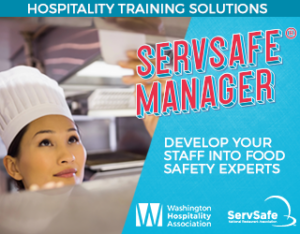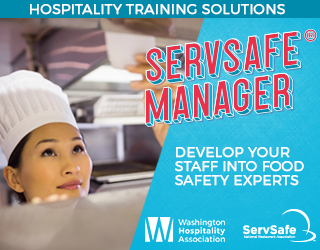
Updated May 25, 2023
As we look to find new ways to overcome our labor shortage, many operators are turning to a demographic that hasn’t received as much attention from the industry in recent years – teenagers. While the association doesn’t recommend hiring 14- and 15-year-old workers, the rules for 16- and 17-year-olds are a little more flexible.
Employers need to have an updated Parent Authorization for Summer Work on file for each team member who is under the age of 18. Businesses do not need to submit this form to L&I, but must have it on file if audited.
Note: If the minor continues employment into the school year, the employer must complete the Parent/School Authorization form by September 30 each year or when the work schedule changes.
The current workforce shortage is forcing many in the hospitality industry to rethink their approach to staffing. Even with Washington state fully reopened, it could take years for hospitality businesses to hire and retain enough staff to meet demand.
New in 2023
The government affairs team actively supported House Bill 1730, which will allow 18 – 20-year-olds to work for 21 and older establishments, so long as the employee is not employed in any positions that include serving alcohol, food or interacting with patrons. In addition, they must work under a supervisor who is at least 21 years old. This will help us build our workforce as we continue to look for employees. The bill included an emergency clause, however that clause was vetoed by the governor. Therefore the bill takes effect on July 23, 2023.
Another bill the association supported during the 2023 legislative session was House Bill 1658. This bill allows high school students age 16+ to receive elective credit for paid work experience in any industry. The student would need to work 360 hours per credit and could earn up to two credits. The Office of the Superintendent of Public Instruction will initiate rulemaking to implement paid work experience provisions. After the rules are approved, employers will be able to participate in this program alongside students.
CEO Podcast
Washington Hospitality Association President and CEO Anthony Anton talked about the many factors that are contributing to the labor shortage in the June 2021 episode of our CEO Podcast. Be sure to check out that replay here.
Anthony also discussed teen labor with OSPI Superintendent Chris Reykdal and Reed Simock, youth employment specialist at Labor & Industries in the September 2022 episode of the CEO Podcast.
So how do businesses overcome these challenges? The answer to that question will look different for every employer. But nearly all employers will likely need to expand their applicant pool to attract new employees.
Prior to the pandemic, many small businesses had policies and practices in place that required employees be at least 18 years old. But in the face of the current workforce shortage, many employers are revisiting those policies and expanding job opportunities to more young workers.
There are several state laws and rules in place for employers who hire teen workers. The association’s HERO has all the information you need if you’re expanding your applicant pool to include those younger than 18.
The Washington State Department of Labor & Industries also has a wealth of resources for helping employers stay compliant with current state laws and rules related to teen workers. Those resources include age-specific work restrictions, required documentation, allowable work hours, and wage, meal & rest break requirements.
Documentation
Minor work permit
Businesses that employ minors must obtain a minor work permit from the Department of Revenue. The business must also have an Industrial Insurance endorsement.
Parent/guardian permission and school permission
Parent or guardian permission is needed to employ minors. You can download this parental permission form here for minors who are currently on summer break. Use this parent & school permission form for any minor who is also attending school during their employment.
Proof of age
Businesses must also keep on file proof of age for each minor. Acceptable documents include a copy of:
- Birth certificate and Social Security card
- Driver’s license
- Baptismal record
- Notarized statement from the parent or legal guardian
Other information to keep on file
Maintain records of work schedules, rest breaks and meal breaks. It is strongly recommended that businesses keep timecards as well as work schedules. In the event of a wage claim, L&I industrial relations agents don’t count work schedules, only timecards.
Wage laws
Minor employees younger than 16 must be paid at least 85% of the state’s minimum wage. Employees 16 and older must be paid at least the current state minimum wage or the local minimum wage where applicable.
Meal breaks
Employers must provide meal periods and rest breaks.
14- and 15-year-old workers:
- May not work more than four hours without a 30-minute, uninterrupted meal break that is separate from and in addition to rest breaks.
- Must also be provided a paid rest break of at least 10 minutes for every two hours worked.
16- and 17-year-old workers:
- May not work more than five hours without a 30-minute, uninterrupted meal break that is separate from and in addition to rest breaks.
- Must also be provided a paid rest break of at least 10 minutes for every three hours worked.
Since the purpose of meal periods and rest breaks is to provide rest from work, they should not be scheduled near the beginning of a work shift.
Promoting a safe and healthy work environment
Make sure your minor employees (and all your employees for that matter) understand how to work in a healthy and safe environment. Do your employees know the potential hazards of the job? Do they know who to ask with a question about safety?
Here are good safety questions you should make sure your employees can answer. And check out this list of prohibited job duties for young workers.
Danger of working around hot-oil fryers (Hazard Alert)
Aerosol cooking oil products can explode (Hazard Bulletin)
We want to hear from you!
What labor challenges are you facing right now? Have you recently shifted to hiring more young workers? Do you have success stories you’d like to share? If so, we’d like to hear from you. Send us your experiences at communications[at]wahospitality.org.
Additional Resources
- National Restaurant Association: Tapping the teen market
- Business Insider: Teen employment could hit record highs in 2021 as US business owners flock to hire young workers in a tight labor market
- Bloomberg: Why Teenage Workers Are Leading the Recovery
- L&I: Employing teens under 18 in food service?
- L&I: Teens make great workers when employers help them develop quality work skills and safe work practices
- AIHA: Teen worker safety matters
- Erik Soper: The teen worker’s survival guide
- NIOSH Alert: Preventing deaths, injuries and illnesses of young workers














![Webinar replay! [Ask a Lawyer] Best hiring practices](https://wahospitality.org/wp-content/uploads/2024/05/CatherineHiring-webinar-150x150.png)









